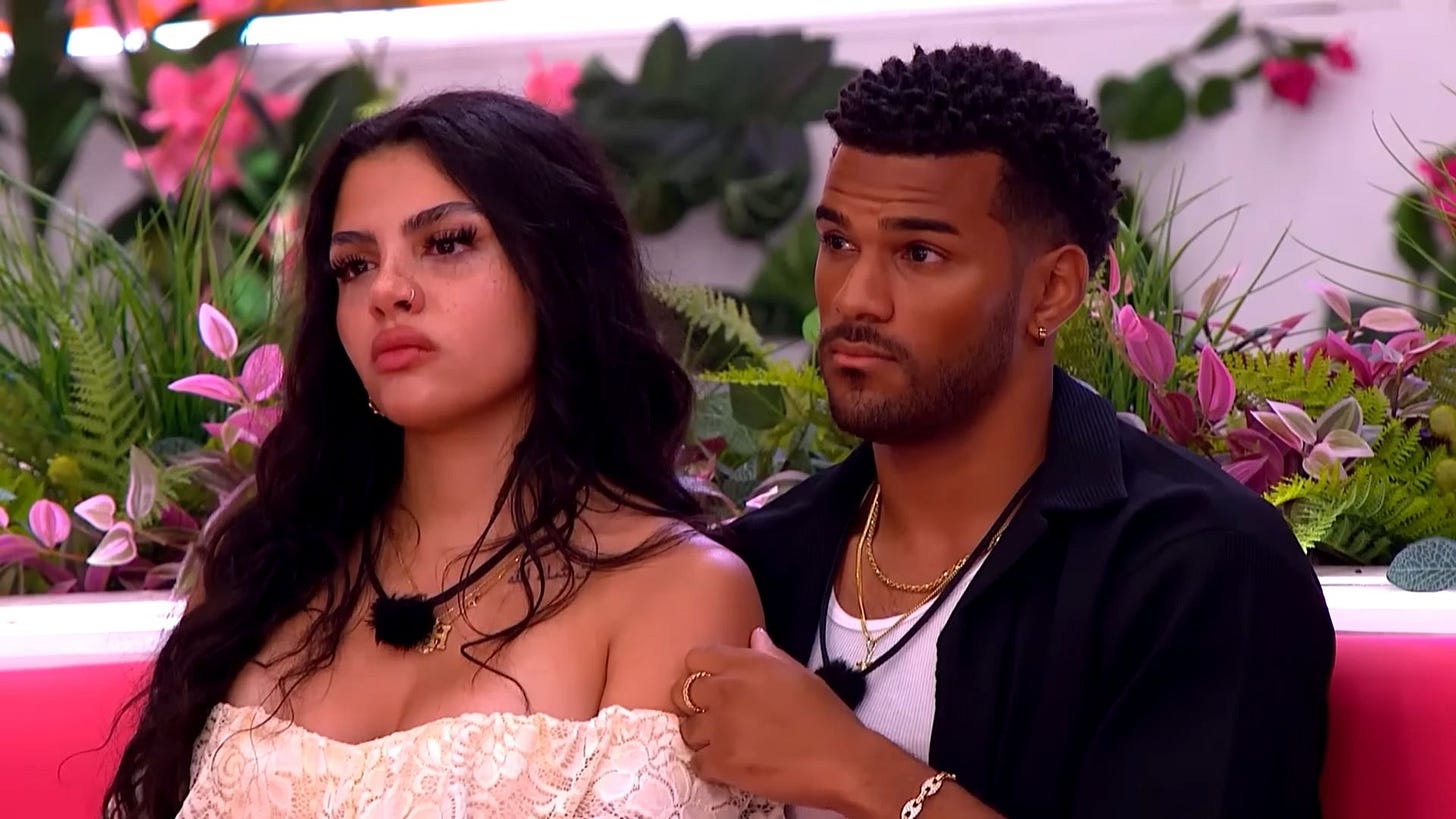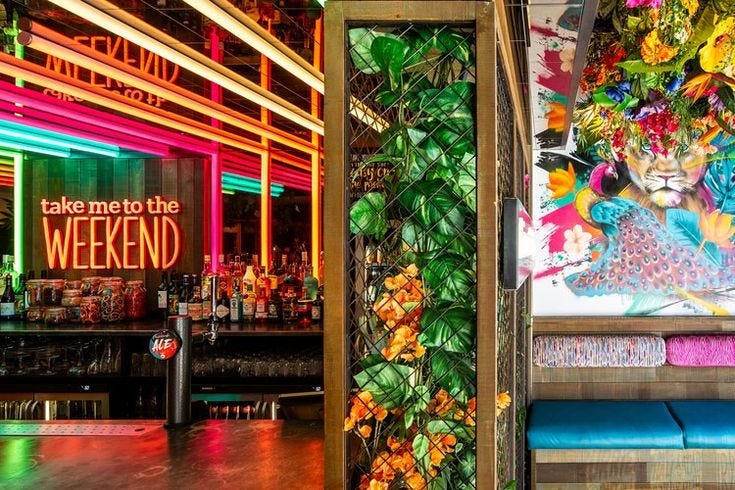Freedom From Discernment
Watching Love Island & Finding Charm in the Low-Brow
I don’t consider myself pretentious, but I do have great taste (which is perhaps the sort of thing you might expect a “pretentious” person to say). Too often, “pretension” and “passion” are conflated, particularly in a culture that favors automation and flourishes off a lack of discernment. Having too rigid a preference is shocking to a palate that’s been muddled and numbed by the algorithm. Pretentiousness and preference, doggedness and inflexibility - there’s a line between all of them that can move and blur depending on the situation. I usually pride myself on my sense of discernment, as I take pride in my sense of taste, but there are times when I falter. And, consequently, times when I’m too proud altogether.
Having good taste doesn’t preclude you from dipping a toe in that which is low-brow. A good sense of taste can uncover substance in the uncouth and the cultivated, and swim in the space where they overlap - the delicious oval in their Venn diagram. People with good taste have open minds and cautious optimism. This is how I found myself watching season 7 of Love Island USA with my little sisters in the Schiphol airport in Amsterdam.
We found a secluded area of the airport for our viewing - a high-walled booth in a vacant area of the airport’s food court. We angled the laptop towards us, turned the subtitles on, and lowered the volume to a level that our ears could just manage to hear - all of our actions as clandestine as teenagers torrenting a movie on their family computer. Our behavior felt illicit because the content of Love Island USA is near illicit - wavering between Bad Girls Club, The Bachelor, and soft-core porn in the span of a sixty minute episode.
If I were to liken the Love Island franchise to any other programs, I would certainly reference The Bachelor, but also Big Brother, Black Mirror, and probably The Hunger Games. Love Island is a dating competition show with panoptic qualities unlike any other television program. The male and female contestants all live in a villa in Fiji outfitted with dozens of cameras and microphones. Week-to-week, the “islanders” pair up in “couples,” within which they’re encouraged to explore a romantic connection. But the couples are subject to “recouplings” on a weekly-ish basis, as well as eliminations and the introduction of “bombshells” - or new contestants - who “test” their existing connections. Viewers also have the opportunity to dictate the show’s proceedings by voting on their favorite couples and deciding who should be up for elimination week-to-week.
Love Island also has “challenges” that are highly sexual in style and attempt to give the show some kind of “competition” format. But the best moments happen within the daily conversations captured by semi-hidden cameras. The islanders, who don’t have access to their phones or the internet, are filmed 24/7 and are beholden to the show’s editors, and America’s reaction to the edit. New episodes air every day of the week except Wednesday (and Saturday, on which Love Island: Aftersun, a weekly recap program, airs). The women are all painfully beautiful, of the uncanny Instagram model variety. They strut around in bikinis, stilettos, and full faces of makeup. The men look like typical attractive human men - good-looking cashiers at Trader Joe’s or T-Mobile.
The show infuses the shock value of “sex” into its every orifice - twerking challenges, lingerie parties, night cam footage of islanders having actual sex - that it loses any kind of eroticism. The viewers’ nerves become so burned out that they can watch contestants spit milk into each other’s mouths without lifting a brow. The horseshoe becomes a complete circle - watching makeout contests becomes akin to watching paint dry. Not to out myself as squeamish, but I’ve never been able to survive a whole season.
However, what continues to make the show interesting to me is the paranoia and stir-craziness that constant surveillance and the absence of outside contact instill in contestants. About halfway through the six-week season, the contestants are given a challenge that breaks the fourth wall - they’re delivered fan tweets about the show and are tasked with sorting which tweet is about who. This glimpse of outsider opinions makes the islanders go berserk; they wake up to the fact that they’re living in a version of The Truman Show. It feels cruel - Stanford Prison Experiment-esque. It’s unsurprising to me that contestants form intense attachments to one another under such conditions. When two islanders confess love after six days of knowing each other, I believe them wholeheartedly.
Part of what’s made season 7 most interesting to me - and the rest of America - is the intense attachment Huda and Jeremiah formed within mere days of the season beginning. When Jeremiah begins pulling away from Huda, following days of showering her with love and attention, and begins exploring his feelings for another contestant, Huda becomes controlling and enraged, cussing him out in front of the entire villa, eavesdropping on his conversations with friends, and shedding many loud tears. All for a man she didn’t know ten days ago.
At the Schiphol airport, my sisters and I are watching a one-sided fight between the couple. After listening to a private conversation between Jeremiah and his friends, Huda pops out from behind the corner, where she’d been lurking, and screams at him. A smug look graces her face, but it melts into tears as soon as she’s out of his view. She pops back out repeatedly to shout at him some more, flipping him the bird.
As the show cuts to commercial, my sisters are shaking their heads. Their view of Huda is in line with most of the internet’s - they all think she’s aggressive and overly attached, that she needs to lighten up and loosen her grip. When she survives another week of the show, my sisters and the internet are flabbergasted. How could she have made it this far? When will she go home?
I tell my sisters that I hope that she stays on for longer, and their eyes widen in bewilderment. But she’s crazy! She’s desperate for attention; she’s setting an “unhealthy example.” I ask them what else they could want out of a contestant on Love Island - a show that bastardizes romance and eroticism to the nth degree, juicing them until nothing but the pulp remains. Huda and Jeremiah, and every other “islander” are characters - I have to believe they’re characters - and what other kind of character would you want on such a provocative show? There’s a reason why no one watches The Bachelor anymore - it’s all juice, no pulp. We don’t really still believe people can fall in love on TV, do we?
Love Island is a project of provocation and surveillance. The show’s thesis rests on one question: how big a spectacle are you willing to make to ensure brand deals are waiting for you on the other side? And if you find romance along the way, that’s great too - love is an accoutrement, not the main course. A character like Huda is exactly what the show requires. Those who realize that may be on their way to honing their sense of discernment, and perhaps, their sense of taste too.
I am thinking of Love Island USA and discernment when my family and I are seated at an eatery in Paris, France, that I can only describe as a “scammer restaurant.” We’re at the tail end of our big family trip and trying to start our stint in France off with a bang. If you’ve traveled to enough big cities, I’m sure you know what I mean by “scammer restaurant.” Dirty pink seat cushions and striped umbrellas, fake leafy plants, neon pink signs, vape clouds in the air, lukewarm pesto for $50 a plate. “We’re in Paris!” exclaims my mom, but we could be in Miami, or Glendale, or Salt Lake City, or anywhere in the world, really. There’s a smear of mustard across my plate, and a dried chunk of risotto congealed onto my spoon. I ask the waiter for clean flatware, and he gives me another dirty spoon. I ask for another one.
Most of the party eats their dinner in high spirits, except for me, who’s contemplating whether or not to say something. Say what exactly, I don’t know. I am debating whether or not it’s pretentious to inform everyone that we’re getting completely ripped off. We only have a few dinners to eat in Paris, and it’s a bit upsetting (and inevitable) that at least one of them will fall prey to a tourist trap. But my family is genuinely enjoying it, not noticing how the coating is separating from the filling of the aranchini, not noticing the stained utensils. Who am I to interrupt their joy? Deceit to one woman is a treat to another. If saying something doesn’t make me pretentious, it certainly makes me annoying.
I can go low-brow and I can go high-brow, but I can’t stand one failing to camouflage as the other. Especially when the prices are misaligned. My mom is catching onto my mood now, and I’m trying my best to hide it, lest I seem ungrateful. I am being ungrateful. Or am I being discerning? The pink seat cushions, the sunshine, the filler, the snapback-clad man walking around the restaurant vlogging - it all harkens to the Love Island villa. I can imagine the islanders crying and cussing one another out at any of these tables.
Ultimately, having good taste means understanding what the setting requires. There are only so many life teachings to be gleaned from a show that focuses on a very specific, hyper-sensational, id-driven fragment of the human psyche. Love Island is a show about being pushed to a kind of emotional edge, requiring people who are going to perform obnoxiously when pushed to that brink. The best conclusions about the show are drawn in context before being applied to the real world. And the best performers are tailored to the show’s format, possessing a beauty and boldness that translates best through the mediation of a screen.
When asked what I thought about the meal, I answered honestly and clumsily. The joy in the room dialed down like a dimmer switch. My pride got the best of me, eclipsing my taste in the process. Taste demands a person to understand their setting, and also their audience. It requires you to, on occasion, abandon your syllabus. And importantly, it asks you to consider context. Isolated villa, paranoid guests, hungry America; when paired together in such a way, they make for a program so untasteful, it’s suddenly insightful. When to go low, when to go high, and, in the case of Love Island, when to go lower - all key points of discernment for the tasteful eye.
The joyfulness found in the eye of a delusion - perhaps it’s worth dwelling there from time to time. Like paying the absurd cover for a bar on New Year’s Eve to ensure you’re on the dance floor when the clock strikes twelve. There’s charm in the grimy, in the low-brow, but there might even be charm in the places where low and high misalign. Perhaps there is charm in reality TV tears, as there is charm in the feeling of your family getting blissfully ripped off in a foreign country. Only for you to switch off the screen and find a reasonable place to eat next. There’s charm in the unreasonable and occasional freedom in a lack of discernment, after so much time parsing out your preferences. Next time, I’ll just eat my food.








I think bad taste flourishes because it invites space for joy and human connection, unencumbered by the trappings of art or high culture. Compare the experience of watching Love Island with siblings/friends and gushing over the messy drama and absurd plots to the experience of watching something that is indisputably high culture. The Love Island experience, which is devoid of any pretensions to good taste, is really about the viewers’ interactions with each other - the gossip, the memes, the in-jokes. And it actually kind of works, creating a shared language and synthetic culture among groups of viewers that will be remembered a decade later. Low-brow restaurants are kind of the same. The kitschy decor, pumping music and transient clientele all signal to the customer “don’t take this too seriously, the meaning is what you make it.” A diet of purely low-brow culture would be exhausting, like a dopamine-saturated brain that cannot find joy in anything. But the enduring legacy of bad taste, when people are objectively capable of creating something less tacky, is that in moderate doses, bad taste is an invitation to step out of the heavy world of ideas and culture and find some child-like joy in bonding with others.
What a fun piece! Thanks for sharing. I enjoyed the juxtapositions between high-brow, low-brow, and lower-brow and how they can coexist.